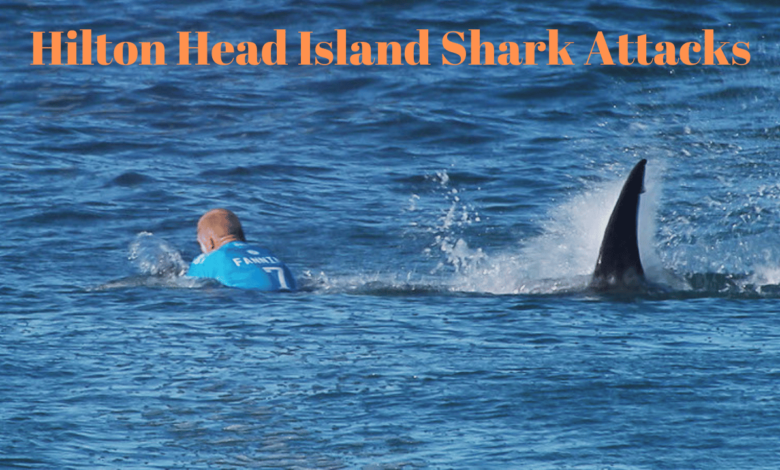Hilton Head Island Shark Attacks: What You Need to Know

South Carolina’s Hilton Head Island is a well-liked vacation spot because of its gorgeous beaches, golf courses, and luxurious resorts. However, it has also gained notoriety for an increasing number of shark attacks in recent years. The purpose of this article is to give a thorough summary of shark attacks on Hilton Head Island, including recent incidents, the types of sharks found in the area, safety tips for beachgoers, and expert opinions on the matter.
Recent Shark Attacks on Hilton Head Island
2021 Incidents
In 2021, Hilton Head Island saw multiple shark attacks that drew significant media attention. In May, a 26-year-old man named Wyatt Bowman was bitten while swimming at Burkes Beach. The shark, estimated to be about 5 feet long, bit him on the heel and lower ankle. Bowman underwent orthopedic surgery and was unable to walk for several weeks following the attack.
In August of the same year, a lifeguard was bitten near the Barrington Arms Villas complex at Palmetto Dunes Oceanfront Resort. The lifeguard suffered several lacerations and was treated at a hospital in Savannah, Georgia. Experts believe a blacktip shark was likely responsible for the attack.
2022 Incident
In August 2022, two people were bitten by sharks off Myrtle Beach, which is relatively close to Hilton Head Island. These incidents, while not on Hilton Head itself, highlight the prevalence of shark activity in the region during the summer months.
Other Notable Cases
One of the most dramatic incidents occurred in 2018 when a 10-year-old boy named Jei Turrell was bitten while playing in waist-deep water. The shark’s teeth cut through to the bone of Jei’s forearm. Despite the severity of his injuries, Jei remained brave and positive throughout his recovery.
Types of Sharks in Hilton Head Waters
Hilton Head Island’s waters are home to a variety of shark species. Common coastal species include the blacktip shark (Carcharhinus limbatus), finetooth shark (Carcharhinus isodon), and bonnethead shark (Sphyrna tiburo). Larger, more notorious species such as tiger sharks (Galeocerdo cuvier), great hammerheads (Sphyrna mokarran), and occasionally great white sharks (Carcharodon carcharias) are also found in the area.
Sharks are primarily found several miles offshore, but encounters in shallow waters can and do occur, especially during the summer when both shark and human activity in the water peak.
Shark Attack Prevention and Safety Tips
Shark attacks are uncommon, but they can occur, and in order to reduce the risk, steps must be taken. Here are some safety tips for beachgoers on Hilton Head Island:
- Refrain from Swimming at Dawn and Dusk: Sharks are most active during these times as they hunt for food.
- Stay in Groups: Attacks by sharks are more frequent in solitary individuals.
- Avoid Wearing Jewelry: The reflected light can resemble fish scales, potentially attracting sharks.
- Stay Close to the Shore: Avoid swimming too far from the shore, where help is more readily available.
- Avoid Areas with Fishing Activity: Bait and caught fish can attract sharks.
- Heed Local Warnings: Pay attention to any posted signs or warnings about shark sightings or recent attacks.
- Do Not Enter the Water if Bleeding: Sharks are attracted to blood and can sense it from miles away.
Expert Opinions on Shark Attacks
Experts agree that shark attacks, while terrifying, are exceedingly rare. According to David Angotti, founder of Florida Panhandle, The probability of passing away in a shark attack is minuscule compared to other risks like lightning strikes or fireworks accidents.
Daniel Abel, Coastal Carolina University’s marine science professor, emphasizes that most shark bites are cases of mistaken identity, where sharks confuse humans for their typical prey, such as seals. Abel recommends avoiding swimming near schools of fish or areas where fishing activities occur, as these conditions can attract sharks.
The Impact of Shark Attacks on Tourism
Despite the media attention shark attacks garner, they have had a limited impact on tourism on Hilton Head Island. Millions of people continue to travel to the island each year, drawn by its scenic beauty and recreational opportunities. Local authorities and businesses work diligently to ensure the safety of visitors, regularly monitoring shark activity and providing timely warnings when necessary.
Shore Beach Services, which manages many of Hilton Head’s beaches, takes several precautions to protect swimmers. These include daily patrols, posting warning flags, and closing beaches temporarily if sharks are spotted close to shore. Mike Wagner, operations manager for Shore Beach Services, highlights the importance of educating the public about shark safety and responding swiftly to any incidents.
Conclusion
Shark attacks on Hilton Head Island, while rare, are a reality that beachgoers must consider. By understanding the types of sharks in the area, following safety tips, and heeding expert advice, visitors can significantly reduce the risk of an encounter. Despite the occasional shark attack, Hilton Head Island continues to be a popular and safe travel place to go if you want a unique beach experience.
FAQs About Hilton Head Island Shark Attacks
Q1: How common are shark attacks on Hilton Head Island?
A: Shark attacks on Hilton Head Island are relatively rare. While there have been several incidents in recent years, such as multiple attacks in 2021 and a notable case involving a 10-year-old boy in 2018, the overall likelihood of encountering a shark is low.
Q2: What types of sharks are found around Hilton Head Island?
A: The waters around Hilton Head Island host various shark species, including blacktip sharks, finetooth sharks, bonnethead sharks, and occasionally larger species like tiger sharks and great white sharks.
Q3: What should I do if I see a shark while swimming?
A: If you see a shark, remain calm and slowly back away towards the shore. Avoid splashing and making sudden movements, as these can attract the shark. Alert a lifeguard or other beachgoers immediately.
Q4: What safety measures can I take to avoid a shark encounter?
A: To minimize the risk of a shark encounter, avoid swimming at dawn or dusk, stay in groups, avoid wearing shiny jewellery, stay close to shore, avoid areas with fishing activity, heed local warnings, and do not enter the water if bleeding.
Q5: What should I do if a shark bites someone?
A: If a shark bites someone, get them out of the water immediately and call for medical help. Apply pressure to the wound to control bleeding and keep the person calm and still until help arrives.
You May Also Read: Shipn Utsunomiya: Unifying Innovations and Traditions




